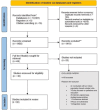Mapping end-of-life care in India: a scoping review to identify gaps in policy, practice, and psychosocial support
- PMID: 40624669
- PMCID: PMC12235897
- DOI: 10.1186/s12904-025-01825-z
Mapping end-of-life care in India: a scoping review to identify gaps in policy, practice, and psychosocial support
Abstract
Background: Little about access to palliative and end-of-life care in India is known.
Aim: To map various facets of end-of-life care in India, from perceptions of stakeholders to capacity and quality of care, training, and education, and to identify the current gaps in end-of-life care delivery.
Design: A scoping literature review was conducted, with the protocol registered on the Open Science Framework, on November 29, 2023 ( https://osf.io/twc9j ).
Data sources: Between January 1, 1990, and May 31, 2024, an electronic literature search was conducted using the MEDLINE, SCOPUS, CINAHL, EMBASE, and PSYCHINFO databases, as well as citations and grey literature.
Results: The availability and accessibility of end-of-life care are limited to a few geographical regions, primarily urban areas. While some states have community-based programs, most end-of-life care practices are concentrated in hospitals, especially intensive care units. Patients frequently lack access to essential medications, such as morphine, as well as appropriately trained medical professionals and adequate infrastructure. Financial difficulties, limited knowledge, social stigma toward the terminally ill and dying, and the psychological and physical burdens of care add to the challenges faced by stakeholders.
Conclusion: The availability and accessibility of end-of-life care in India are fragmented. A comprehensive strategy that includes policy and legislative reforms, education, and expanded palliative services is crucial for improving the quality of end-of-life care across the country.
Keywords: Caregivers; Hospice care; India; Palliative care; Terminal care.
© 2025. The Author(s).
Conflict of interest statement
Declarations. Ethics approval and consent to participate: Not applicable. Consent for publication: Not applicable. Competing interests: AG is an editorial board member for BMC PC, the rest of the authors declare that they have no competing interests.
Figures


Similar articles
-
Community and hospital-based healthcare professionals perceptions of digital advance care planning for palliative and end-of-life care: a latent class analysis.Health Soc Care Deliv Res. 2025 Jun 25:1-22. doi: 10.3310/XCGE3294. Online ahead of print. Health Soc Care Deliv Res. 2025. PMID: 40580081
-
Interventions for interpersonal communication about end of life care between health practitioners and affected people.Cochrane Database Syst Rev. 2022 Jul 8;7(7):CD013116. doi: 10.1002/14651858.CD013116.pub2. Cochrane Database Syst Rev. 2022. PMID: 35802350 Free PMC article.
-
The use of Open Dialogue in Trauma Informed Care services for mental health consumers and their family networks: A scoping review.J Psychiatr Ment Health Nurs. 2024 Aug;31(4):681-698. doi: 10.1111/jpm.13023. Epub 2024 Jan 17. J Psychiatr Ment Health Nurs. 2024. PMID: 38230967
-
Patients' and caregivers' experiences of familial and social support in resource-poor settings: A systematically constructed review and meta-synthesis.Palliat Care Soc Pract. 2025 Jun 27;19:26323524251349840. doi: 10.1177/26323524251349840. eCollection 2025. Palliat Care Soc Pract. 2025. PMID: 40584974 Free PMC article. Review.
-
Health professionals' experience of teamwork education in acute hospital settings: a systematic review of qualitative literature.JBI Database System Rev Implement Rep. 2016 Apr;14(4):96-137. doi: 10.11124/JBISRIR-2016-1843. JBI Database System Rev Implement Rep. 2016. PMID: 27532314
References
-
- Chatterjee SC, Sengupta J. Death and dying in india: ageing and end-of-life care of the elderly. Death Dying India Ageing End-of-Life Care Elder. 2017;:1–161.
Publication types
MeSH terms
LinkOut - more resources
Full Text Sources

